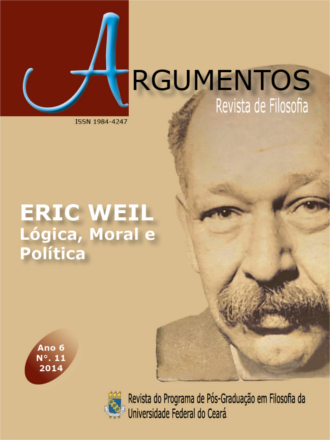The unity of the moral man: elements for a Weil-schiller relationship
Keywords:
Eric Weil. Friedrich Schiller. Philosophy of morals. Grace and dignity. Moral unity. Moral education.Abstract
If it is true that each serious philosophical effort is built on the history of philosophy, if the reference to philosophical authors of the past and present is a conditio sine qua non for every rigorous conceptual analysis and if, for these reasons, nothing can be called utterly novel in philosophy, then it is not irrelevant to try to make explicit the references that determined the emergence of one’s philosophical thought. This paper aims to present philological and philosophical reasons in support of this hypothesis that one of the main (hidden) source of Eric Weil’s conception of moral life in his Philosophie morale is constituted by the ethical reflection of Friedrich Schiller (in specific the essay Über Anmut und Würde). From a first and immediate proximity of content, the analytical path leads to a more significant distance between the two authors’ methodologies; finally, the complexity of the Weil-Schiller quæstio is clarified in the light of the common reference to the Kantian conception of radical evil.Downloads
Published
Issue
Section
License
Argumentos magazine is licensed under an International Creative Commons Attribution License.
The Magazine uses CC BY inclusion
1) The authors retain the copyright granted to the magazine or the right to initial publication, with the work regularly licensed under the Creative Commons Attribution, which allows the sharing of the work with acknowledgment of authorship and initial publication in this magazine.
2) The authors are authorized to contract additional applicable contracts, for non-exclusive distribution of the version of the work published in this journal (for example, publication in the institutional repository or as a chapter of the book), recognition of authorship and initial publication in this journal.
3) Authors are authorized and encourage to publish and distribute their work online (for example, in institutional repositories or on their personal pages) at any time before or during the editorial process, as they can generate productive changes, as well as increase the impact and reference of published work.




.jpg)










._._3.png)
1.jpg)
._._._.png)
